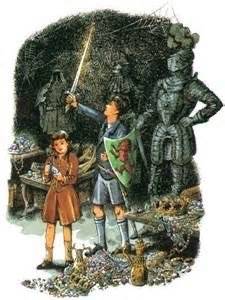
Our project to read the entire Chronicles of Narnia by C.S. Lewis is now half way through. Last Tuesday, about a dozen of us “Narnians” met to discuss the third book in the series, Prince Caspian (PC). We continue to be amazed and delighted at how these apparently simple children’s fantasies contain depths of meaning and offer insights into how we live our faith.
Written in 1950, PC is set one English year after the events described in The Lion, The Witch, and the Wardrobe, but when the four Pevensie children (Peter, Susan, Lucy and Edmund) are summoned back to Narnia, they find themselves in the ancient ruins of the castle, Cair Paravel, where they were once kings and queens. Slowly, the children realize that during one English year, centuries have gone by in Narnian time (time travel and alternate worlds always fascinated Lewis).
During those centuries, catastrophe has again befallen Narnia. The realm has been conquered by an evil king, Miraz, and Aslan, the Talking Animals, and Old Narnia are now just legends spoken of in hushed tones. Miraz’s nephew, Caspian, is told these legends by his nurse and then by his tutor, but learns that his uncle has forbidden any mention of them, for the tyrant Miraz and his people secretly fear the return of Aslan.
When Caspian flees his uncle’s castle, he discovers that the Old Narnians - dwarves, fauns, Talking Animals - are real and live in remote places where they yearn for freedom. Caspian is proclaimed rightful king of Narnia, and with the help of the Pevenisie children (who realize they have been summoned back to Narnia to help Caspian), and with Aslan’s return, they defeat Miraz and bring freedom back to Narnia.
In our reading, we noted the fragility of Narnia (it was previously conquered by the White Witch in the first book) and the longing of the Old Narnians for the return of their rightful king, which is a very Christian theme. Soon in the season of Advent we will once again wait expectantly for the king who will save us from captivity to sin and death.
Likewise PC is about the importance of memory and the need to tell and retell the stories of who we really are and the hope we have in God’s son (whom Aslan often represents). As Caspian’s tutor says, “my old heart has carried these secret memories for so long that it aches with them”. At a time in our history where the Christian stories are falling into neglect, PC has much to teach us about the need to re-learn and keep telling these stories.
Our identity as Christians is likewise shared by the stories we hear and retell during our worship, stories of hope, of the goodness of our king, and of his coming again. Our stories also tell us that we have great potential, that God wants us to be more than we are, in the way that the children of Narnia can become heroes, kings and queens. Thus these simple stories can lead us to the truths at the centre of our faith.
Our next Narnia book study is on Wednesday, Nov 29, at 1:30 pm, when we discuss The Voyage of the Dawn Treader. We’d love to welcome you to our company of “Narnians”.


1 comment:
Really interested to hear of your Narnian studies. The books have been my companions since childhood. All the best with your continuing exploration.
Alan
Post a Comment